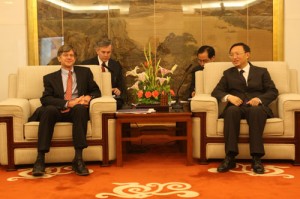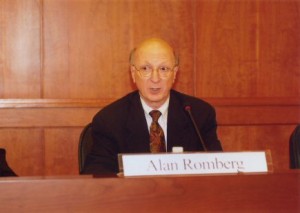The upshot of the recent trip to Beijing by NSC Senior Director Jeffrey Bader and Deputy Secretary of State James Steinberg? The U.S. got an earful about China’s top three foreign policy concerns: “Taiwan, Taiwan, Taiwan” (courtesy of The Cable).
“It was all about Taiwan,” said Bonnie Glaser, senior fellow at the Center for Strategic and International Studies (CSIS), who got readouts of the meetings from Chinese sources in the know. “The message that the Chinese are giving us is ‘We’ve had enough; we’re fed up. We’ve been living with this issue of U.S. arms sales for too long and it’s time to solve it.'”
The Obama team has been noticing increased confidence on the Chinese side when dealing with the United States, and some officials see that as partly a result of the rise of hard-liners within the Chinese system who advocate a tougher stance toward Washington.
But asking the Obama administration to end Taiwan arms sales shows a profound misunderstanding of U.S. foreign-policy decision making, several experts said.
“Do they really think they have a chance in hell of ending our arms sales to Taiwan? I find that shocking, but that’s what they’re telling us,” Glaser said of the Chinese. “I can’t imagine why they think that U.S. interests have somehow changed on this issue. Ultimately that’s why we sell them, because it’s in our interest, not to piss off China.”
As Glaser’s tone suggests, a sense of exasperation with China’s single-minded focus on Taiwan is detectable in foreign policy circles. Despite the Strategic & Economic Dialogues, “strategic reassurance,” and other similar trust-building efforts, it would seem the U.S.-China relationship is still afflicted by acute miscommunication.

Deputy Secretary of State James Steinberg in Beijing
U.S.-China relations experts like Alan Romberg believe that China’s deep-set “strategic mistrust” is one of the core difficulties of the Taiwan arms sales imbroglio. This trust deficit is manifested in the PRC’s claims that arm sales to Taiwan actually “jeopardize” their national security or threaten their “core interests,” accusations that can only be substantiated by cynical or unreasonable interpretations of U.S. intentions.* As America’s China policy set sees it, a pervasive belief that the U.S. ultimately seeks to contain China – economically, politically, militarily or otherwise – is leading the Chinese to their “profound misunderstanding of U.S. foreign policy decision making.”
While this view arguably ignores the symbolism that China has invested in the Taiwan issue, recent commentary from an Chinese expert on the U.S. illustrates PRC policymakers’ misperceptions in action.
In an otherwise thoughtful piece in the Global Times, the scholar Zhang Jiye uses a flawed reading of the U.S. to argue the case for improving American public opinion towards China. Zhang writes that popular antipathy towards China in the U.S. results in, among other bad things, arms sales to Taiwan:
Congressman and other politicians must, as a political necessity, embrace popular sentiment and attack China over democracy, religion, rights, trade, etc.; the military-industrial complex then uses China’s military modernization and popular fear of China’s rise to promote measures like arm sales to Taiwan.
Later, in reference to the arm sale decisions, he chastises Obama for being motivated by populism:
Moreover, [Obama] should not appeal to populism and ‘fool’ [玩弄] with Sino-U.S. relations for the sake of [domestic] political considerations.
This scholar’s recounting of U.S. motivations for arm sales to Taiwan is, if familiar, also seriously mistaken. In a 2001 poll Americans actually expressed opposition to such weapons sales, and the issue has hardly raised the public’s pulse since (and one doubts there is popular support for such arms sales these days, given widespread anxiety about China, economic malaise and disillusionment with costly foreign interventions). Nor is there any evidence to suggest the Obama administration consciously endangered the world’s most important bilateral relationship in order to make a small concession to an interest group it has otherwise stood its ground against. In reality, there is simply a widespread consensus among China policy hands that ending weapons sales to Taiwan would just be bad policy, on the merits.
Zhang’s flawed account of U.S. domestic politics isn’t really notable in and of itself; it is substantially the same hackneyed explanation that is peddled in Chinese state media. It is notable rather because it represents serious scholarship, emanating from the United States research bureau of an influential PRC foreign policy think tank, which lays out a soft power strategy premised on a fundamentally flawed reading of United States politics.
It is conceivable Zhang is consciously exaggerating the importance of public opinion vis a vis Taiwan arms sales to strengthen his proposal for a non-professional audience. That seems unduly cynical, however, considering it is a core part of his argument and that similar views are aired all the time.
Last, just as notable is the fact Zhang’s readings of U.S. intentions vis a vis Taiwan are actually fairly benign – the U.S. is not actually looking to slight China, or strategically contain it – the issue is more one of happenstance, as if arm sales are just whipped up by U.S. politicians who don’t have anything better to do than pick on China.

Stimson Center Distinguished Fellow Alan Romberg
This gets to the most interesting part of this phenomenon. As Romberg explores in detail in his article linked above, the various explanations for U.S. behavior with regard to Taiwan offered up in official and unofficial commentary are often not only implausible, they’re mutually contradictory. This proliferation of inaccurate or paranoid assumptions about U.S. strategy suggests the existence of a taboo within PRC foreign policy circles that mitigates against accepting at face value the U.S.’ avowed intentions for Taiwan. This would square with reports that resolving the Taiwan arms sales issue has become the single-minded focus – bordering on obsession – of Chinese diplomats, who are no doubt under great pressure to cash in on their country’s new-found political weight.
*The most recent package of military articles is defensive in nature and objectively does nothing to upset the Mainland’s overwhelming advantage in the cross-strait military balance. Moreover, as weapons procurement has solidified popular support for President Ma Ying-jeou’s pro-reconciliation stance, the move if anything undermines pro-independence forces on Taiwan.